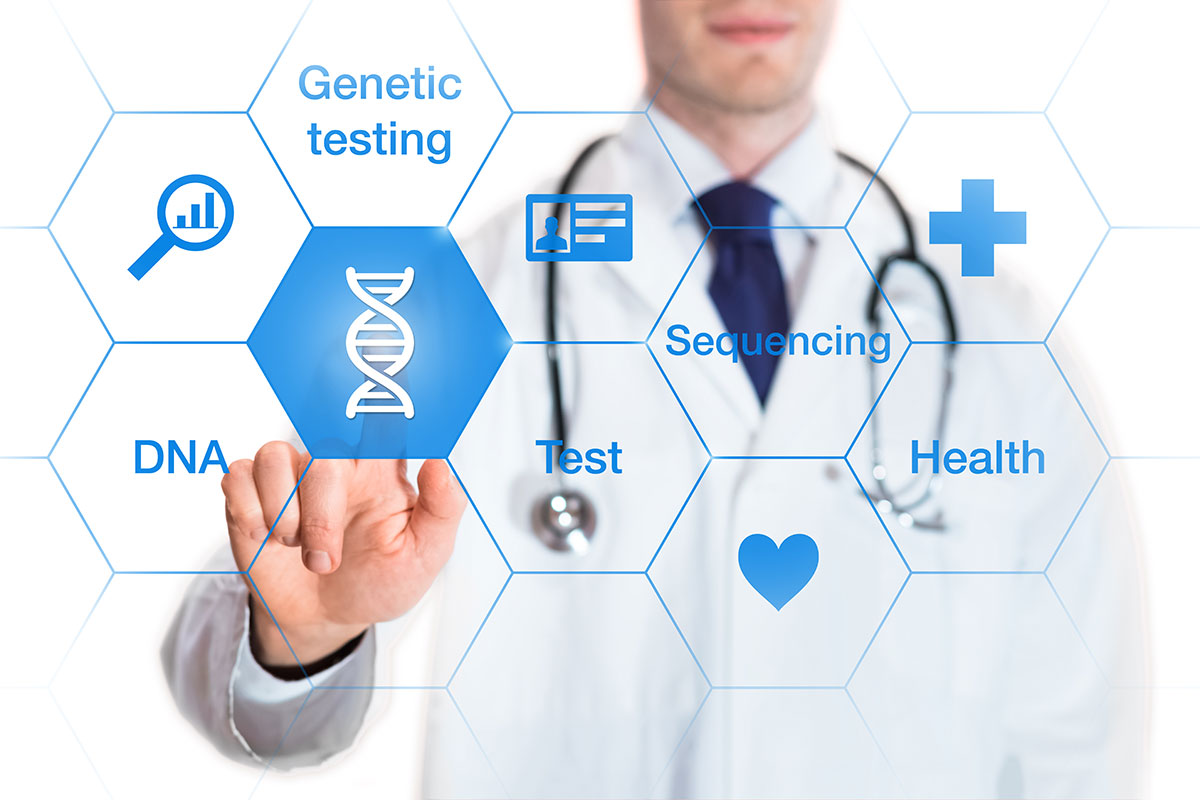
Genetic testing has revolutionized the field of biology and medicine, providing invaluable insights into our genetic makeup. It involves analyzing DNA samples to identify variations or changes that may be associated with certain health conditions, ancestry, or even personalized traits. With advancements in technology, genetic testing has become more accessible and affordable, allowing individuals to gain a deeper understanding of their genetic predispositions. In this article, we will explore 18 captivating facts about genetic testing that shed light on its diverse applications and significance. From uncovering hidden ancestry to predicting the likelihood of certain diseases, genetic testing continues to shape our understanding of ourselves and our potential health outcomes.
Key Takeaways:
- Genetic testing reveals ancestry, predicts disease risk, and guides personalized medicine. It’s like a genetic roadmap for your health and family history!
- Genetic testing is like a genetic detective, solving mysteries about paternity, inherited conditions, and even human migration patterns. It’s a fascinating tool for understanding our genetic story!
Genetic testing can reveal insights into your ancestry.
By analyzing your DNA, genetic testing can provide information about your ethnic origins and ancestral lineage.
Genetic testing can predict the risk of developing certain diseases.
Through the identification of specific genetic markers, genetic testing can indicate an individual’s susceptibility to certain conditions, including cancer, heart disease, and Alzheimer’s.
Genetic testing can help with personalized medicine.
By analyzing a person’s genetic makeup, healthcare providers can tailor treatments and medications to an individual’s specific genetic profile, leading to more effective and personalized care.
Genetic testing can detect genetic disorders in unborn babies.
Prenatal genetic testing allows expectant parents to screen for chromosomal abnormalities and genetic disorders in the developing fetus, enabling them to make informed decisions about their pregnancy.
Genetic testing can determine paternity.
Through DNA analysis, genetic testing can establish biological relationships and determine the biological father of a child with a high degree of accuracy.
Genetic testing can help identify inherited conditions.
By examining an individual’s genetic code, genetic testing can identify inheritable gene mutations that may lead to conditions such as cystic fibrosis, Huntington’s disease, or sickle cell anemia.
Genetic testing can aid in forensic investigations.
Genetic testing techniques, such as DNA profiling, are commonly used in criminal investigations to match suspects to crime scene evidence or establish familial relationships.
Genetic testing can assist in genetic counseling.
For individuals with a family history of genetic conditions, genetic testing can provide valuable information to guide reproductive decision-making and family planning.
Genetic testing can determine drug compatibility.
Some genetic tests can reveal how an individual’s body metabolizes certain medications, helping healthcare providers determine the most effective and safe treatment options.
Genetic testing can assist in identifying potential carriers of genetic diseases.
By identifying individuals who carry genetic mutations for certain conditions, genetic testing can help in family planning and allow for informed decision-making.
Genetic testing can provide information on optimal diet and exercise plans.
Through genetic analysis, individuals can gain insights into their genetic predispositions related to metabolism, nutrient absorption, and physical fitness, helping them make more informed lifestyle choices.
Genetic testing can verify biological relationships in immigration cases.
In immigration proceedings, genetic testing can serve as a reliable method to establish biological relationships between family members in cases where documentation is limited or questionable.
Genetic testing can trace the migratory patterns of human populations.
By studying genetic variations in different populations, researchers can trace the migration routes of ancient human populations and gain insights into human history and evolution.
Genetic testing can identify carriers of hereditary cancer genes.
By identifying individuals who carry mutations in genes such as BRCA1 and BRCA2, genetic testing can allow for proactive measures to reduce the risk of developing certain types of cancer, such as breast or ovarian cancer.
Genetic testing can determine personalized treatment plans for cancer patients.
Through genetic profiling of tumors, genetic testing can help oncologists select the most effective treatments and therapies based on the unique genetic makeup of each patient’s cancer cells.
Genetic testing can be done using various methods.
Genetic testing can be conducted using techniques such as polymerase chain reaction (PCR), DNA sequencing, and microarray analysis, among others.
Genetic testing can analyze multiple genes simultaneously.
Advancements in technology have made it possible to analyze multiple genes in a single test, allowing for more comprehensive and accurate results.
Genetic testing is becoming more accessible and affordable.
As technology advances and more companies enter the market, genetic testing is becoming more accessible and affordable to individuals who seek to gain insights into their genetic health and ancestry.
Conclusion
In conclusion, genetic testing is revolutionizing the field of healthcare and providing individuals with valuable insights into their genetic makeup. From predicting disease risks to identifying inherited conditions, genetic testing offers a wide range of benefits. It helps individuals make informed decisions about their health and empowers them to take proactive measures to mitigate risks. With advances in technology, genetic testing is becoming more accurate, accessible, and affordable. However, it is crucial to approach genetic testing with caution and seek guidance from healthcare professionals to interpret the results accurately. With its potential to unlock a wealth of information about our genetic blueprint, genetic testing is shaping the future of medicine and paving the way for personalized healthcare.
FAQs
Q: What is genetic testing?
Genetic testing is a medical test that analyzes an individual’s DNA to identify variations or changes in specific genes or chromosomes. It involves collecting a sample, such as blood or saliva, and examining the DNA for genetic mutations, gene predispositions, or other markers.
Q: What are the benefits of genetic testing?
Genetic testing provides valuable information about an individual’s health, including the risk of developing certain diseases, potential response to specific medications, and the likelihood of passing on genetic conditions to future generations. It enables personalized healthcare and empowers individuals to make informed decisions about their lifestyle, preventive measures, and treatment plans.
Q: How accurate is genetic testing?
Genetic testing has become increasingly accurate in recent years, thanks to advancements in technology and genetic research. However, it is essential to understand that no test is 100% accurate. Genetic testing may produce false positives or false negatives in some cases. It is important to interpret the results in conjunction with a healthcare professional to ensure a comprehensive understanding.
Q: Is genetic testing only for predicting diseases?
No, genetic testing is not only limited to predicting diseases. It can also be used to determine genetic ancestry, assess carrier status for specific conditions, and establish biological relationships. Additionally, genetic testing can guide personalized treatment plans by identifying genetic markers that affect drug metabolism and response.
Q: Are there any risks or limitations to genetic testing?
While genetic testing is generally safe, it does have some risks and limitations. The results of genetic testing can have emotional and psychological implications, especially if they reveal information about increased disease risk. Moreover, genetic testing may not provide definitive answers for complex conditions or have limited availability for certain rare genetic disorders.
Genetic testing's power to shape healthcare's future is truly remarkable. But what about the visionaries behind companies like 23andMe or the dedicated professionals providing genetic counseling? Explore our articles on Anne Wojcicki's surprising background, 23andMe's extraordinary impact, and genetic counseling's unbelievable role in helping individuals navigate their genetic information. Each piece offers unique perspectives on how genetics is revolutionizing our understanding of health and identity.
Was this page helpful?
Our commitment to delivering trustworthy and engaging content is at the heart of what we do. Each fact on our site is contributed by real users like you, bringing a wealth of diverse insights and information. To ensure the highest standards of accuracy and reliability, our dedicated editors meticulously review each submission. This process guarantees that the facts we share are not only fascinating but also credible. Trust in our commitment to quality and authenticity as you explore and learn with us.


